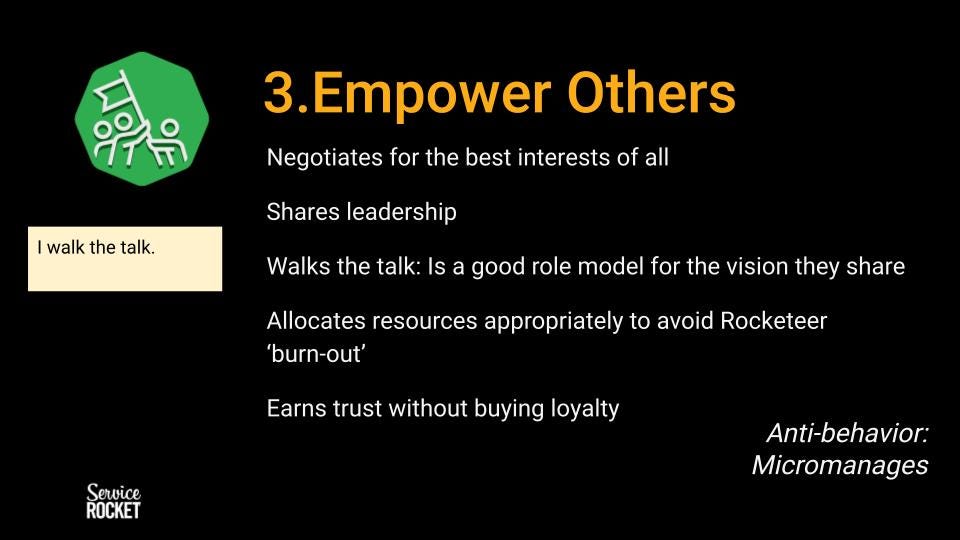Rocketeer Leadership Behavior 3 - Empower Others
Empowerment is the key to scaling. It sounds good, but do you 'walk the talk', are you really good at it? Do you share your power positively or wield it as something to be feared?
Our third Leadership Behavior is Empower Others. Once again, here’s the slide from our super-secret internal deck:
To me, empowering others is the ultimate way to show and share leadership and help your organisation scale. There is so much nuance in this Leadership Behavior, it sounds so simple and logical but practicing and mastering it requires a lot of skill and trust.
I’ve worked for and with many leaders in the past, and always been inspired by those who earned my trust by how they operate, how they go about the details and by how they treat people, regardless of their station.
And that’s important to me. My parents arrived in Australia without much, I’ve written about my Dad in an article here. Growing up, I’ve seen a lot of ways that folks who have power have either used it to reinforce their position or to lift others. The latter is by far more inspirational!
At ServiceRocket, we’re built in fairness, so we want leaders that understand how to give others a go. Allow them to try and support them when things don’t go well, sharing their knowledge and leadership lessons along the way.
One rule that I have is to only hire managers that I would want my own kids to work for and learn from.
Earning trust without buying loyalty is one that has some nuance. There are leaders that earn your trust because of how they operate, not because they hold power over you or pull favors.
The Empowers Others Rocketeer Leadership Behavior has the following sub-points:
Negotiates for the best interests of allShares leadershipWalks the talk: Is a good role model for the vision they shareAllocates resources appropriately to avoid Rocketeer ‘burn-out’
Earns trust without buying loyalty
We’ve built this Leadership Behavior into many of our internal systems as well, the ability for anyone at any level to suggest new product and innovation ideas, and to have a voice and present at our monthly company all-hands.
Anti-Behavior: Micromanages
We think Anti-Behaviors are a clear way to communicate what we don’t want. And to try and be explicit. Nobody likes to be micromanaged, and a highly micromanaged environment stifles creativity.
Our Inspiration
We leveraged the core of this Leadership Behavior from Scaling Leadership by Robert J. Anderson and William A. Adams along with it’s anti-behavior. And then we adapted it for our culture and The series of books and research by these authors and the underlying Leadership Circle framework is used heavily at our company and linking these together made so much sense. In that body of work it distinguishes between leaders being in the state of high creativity or high reactivity. The anti-behavior logically has a canceling effect on the creative side.
The sub-points were inspired by our Rocketeer managers along with the Leadership Circle. I’ll write more in a future post how we use this leadership framework in our company across the globe in a scalable way.
Some great resources for this Leadership Behavior include*:
Why do we have Leadership Behaviors? Isn’t this what Core Values are supposed to do? See my previous post below on ‘When are Core Values not enough?”, but in short Leadership Behaviors give you explicit coachable items to work with your team to help them get better. Telling someone they have fallen on a behavior is much easier to correct and improve, whereas telling someone that they have failed against values is akin to telling them that they’ve been banished from the tribe.
In my opinion, companies need to define these behaviors if they are truly invested in growing their employees to reach their potential. We outline this in our Rocketeer Promise.
When are Core Values not enough?
·
FEB 9
*I have some amazon affiliate codes on book links, I may make billions from these and quit my job.
**Over time these posts will be updated with more links, tweaks and changes as we learn more. Nothing is ever final at ServiceRocket, and we don’t like “unveiling” things.



It has often been said that great leaders surround themselves with talented people (in some ways even more talented). What is the point of this if they are not empowered to lead on key deliverables and share their knowledge/ability. Plus, sharing leadership simply gets things done faster--keeping in mind another common piece of advice: trust, but verify.